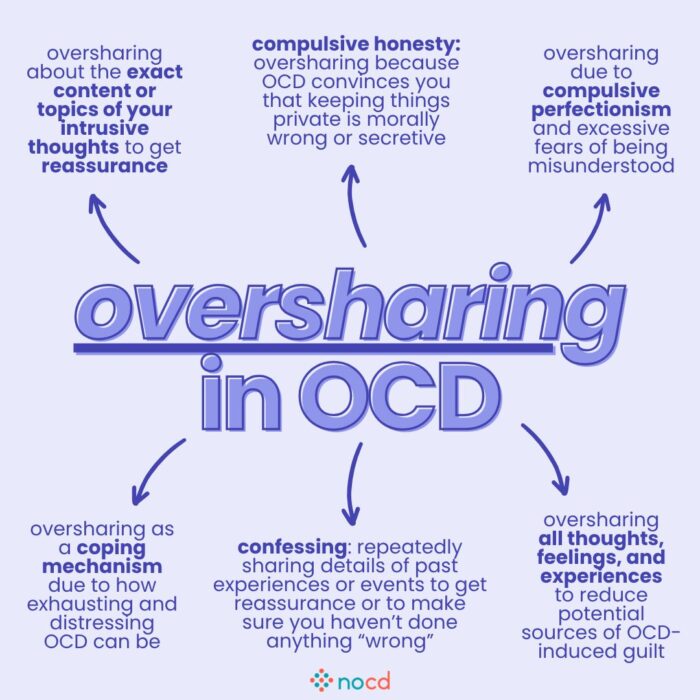This is a guest post by Alegra Kastens, a licensed Marriage and Family Therapist who founded the Center for OCD, Anxiety, and Eating Disorders.
Is it helpful to share your OCD symptoms with someone else? The answer depends on your intentions. Sharing your experiences with another person can bring us support, validation, and empathy, but could also fuel OCD’s fire if the sharing is a compulsive confession.
What is compulsive confession?
People with OCD may feel the urge to confess unwanted thoughts, feelings, sensations, images, and urges to another person. They may also confess compulsions that they have performed or other behaviors that they feel guilty about. Think about Real Event OCD or False Memory OCD where a person excessively fixates on something that has actually happened in the past. The confession is typically an admission of something that the sufferer perceives they have done wrong and is an attempt to alleviate anxiety, guilt, or other painful emotions.
In addition to alleviating discomfort related to obsessions and compulsions, people with OCD may confess to be “completely honest” so that the person they are confessing to “truly knows them.” This can happen in therapy offices. A client may feel the urge to tell their therapist every single unwanted thought they have so that the therapist has all the information and can be absolutely certain that the correct diagnosis is OCD. Confession may also be utilized to prevent a dreaded outcome from occurring or as a mechanism of reassurance-seeking (confessing a thought to get the feedback that it’s just a thought and not true).
Compulsive confession does not work. A person may feel temporary relief after confessing, but the confession reinforces to the brain that the obsession is important and needs attention. The obsession gets louder. It also falsely teaches a person that the only way to cope with uncomfortable thoughts and feelings is to perform the compulsion. This is not true. It might be uncomfortable at first to resist confessing, but it leads to much more freedom and relief in the long run.
Confession can also be destructive within relationships. For example, a person with Relationship OCD might compulsively confess every intrusive thought they’ve had about their partner to their partner. Even if the partner knows that the thoughts are part of the OCD experience, it can be painful to hear about.
What about healthy sharing? How can I know the difference?
Sharing your symptoms with another person is not automatically compulsive. There can be great benefit in opening up to another person and letting yourself be known. This can foster intimacy and connection within relationships.
When considering whether something is a confession or healthy sharing, it’s important to look at the intention behind the sharing. What is the reason for sharing this? Are you sharing because you desire support and better understanding of what you’re going through, or are you sharing because you fear something terrible will happen if you don’t? While it’s not always clear cut, compulsive confession tends to be rooted in anxiety, fear, and shame, whereas healthy sharing is rooted in genuine desire. Compulsive confession comes from a place of urgency and fear (“I must confess or else”) and is done repetitively in response to obsessions. Healthy sharing is not as immediate or demanding. It can wait if needed. Those who confess compulsively often say that they do not even want to be confessing. They feel the urge to and the urge is very difficult to resist, as with all compulsions.
It can be confusing when both things exist: the desire for someone to understand your pain and the sense of urgency to confess now. In these instances, it might be more helpful to talk about OCD generally than to confess every unwanted thought you have had. In other words, talk about the experience of OCD without getting into the exact content of specific thoughts.
Two questions to ask yourself and answer honestly are as follows:
- Why am I sharing this?
- What am I hoping to achieve?
These questions can get you closer to understanding what is compulsive confession vs. healthy sharing.
Treatment for Compulsive Confession
Compulsive confession can be treated in therapy just like all other compulsions. Exposure and Response Prevention (ERP) therapy, the frontline treatment for OCD, will target this compulsion specifically in the response prevention portion of treatment. By resisting the urge to confess thoughts and obsessions, you can teach your brain that your thoughts aren’t dangerous, and that you are able to let them pass on their own without confessing them.
If compulsive confession—ir any other compulsions related to your OCD—are getting in the way of you living the life you want to live, please know that it doesn’t have to be that way. You can resist compulsions and tolerate discomfort, even when you have lingering doubts about being “perfectly honest.” You can learn to manage OCD as thousands of others have before you.

